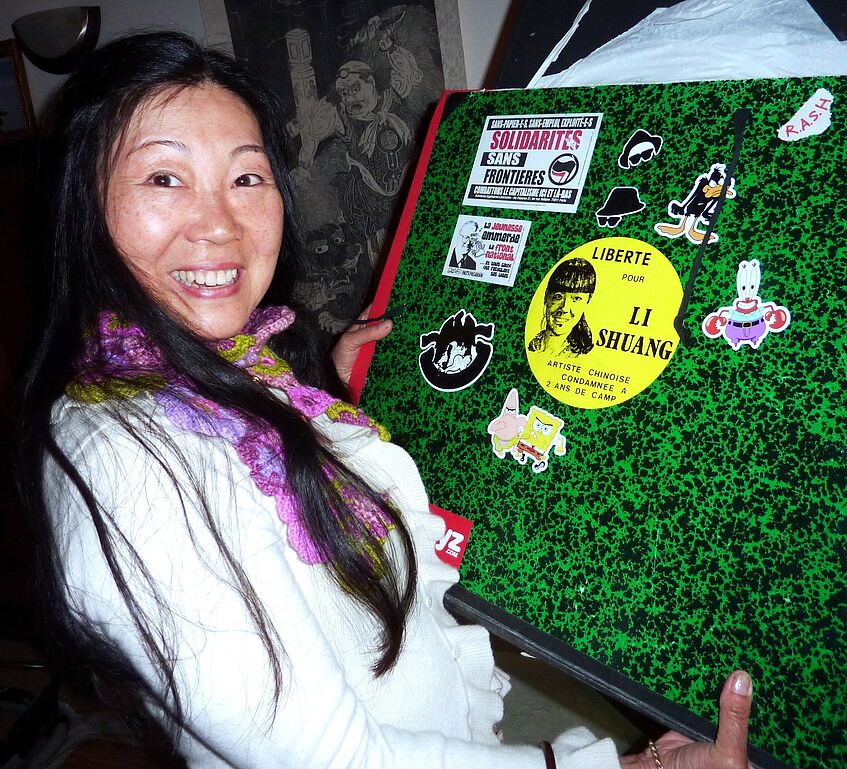Li Shuang

Li Shuang (2014)
Li Shuang
...was born in 1957 in Beijing, her father had been trained as a construction engineer, and was teaching at Tsinghua University. In the big purge of 1957 he was labelled a "rightist" and sent to work on construction sites, while Li Shuang's mother was transferred from Beijing to a post in remote Changchun (North-East China), and the three year old Li Shuang was left in a nursery in Beijing. Only in 1961 the family was reunited again.
When the Cultural Revolution began in 1966, Li's father was beaten and dragged to humiliating "criticism meetings", both parents lost their work, their home was ransacked by Red Guards, and Li Shuang's father was eventually put "under investigation" and locked up at his school.
At the age of fourteen, when she had entered middle school, Li spent time with some neighborhood gangs of unemployed youth who had returned from the countryside, at ninteen Li Shuang was herself sent for agricultural labor to a state farm outside Beijing. The close contact with nature though, made her start painting, and whenever possible she spent time outside to paint landscapes and people. In 1976 she found a job as a stage designer with the Beijing Youth Art Theater, that allowed her to move back to the city.
It was in the apartment of Bei Dao, a young writer then, that Li Shuang met in early 1979 the painter Huang Rui who was just about to plan an independent art exhibition. After inspecting Li's work at the home of Yan Li (who was her boyfriend at that time), Li Shuang was accepted to become a member of the "Stars" group of avant-garde artists. On September 27 they organized their first exhibition in the park outside the Fine Arts Gallery of Beijing. The show was quickly closed down by police, but in late 1979, and again in August 1980, the "Stars" were officially allowed to hold exhibitions in Beijing, and Li Shuang also participated in them.
In 1981, Li Shuang met the French sinologist and diplomat Emmanuel Bellefroid. They entered into a relationship and planned to get married, at a time when Chinese were not allowed yet to have intimate relationships with foreigners. One day, when Bellefroid was out of town, and Li was staying at his diplomatic apartment, waiting police managed to arrest her when she once came down to meet her visiting sister. Li was accused of "hooliganism" and sent to "re-education by labor" for two years, while Bellefroid had to leave China.
Numerous international media reported the "Li Shuang Case" at that time, French rights groups staged demonstrations in front of the Chinese embassy in Paris to press for Li's release. But only when French president François Mitterrand went on an official visit to Beijing in 1983, his conversation with Deng Xiaopoing resulted in the release of Li Shuang, just a week before her "re-education" term would have expired anyway.
When Li Shuang arrived at a Paris airport on November 26, 1983, she was met by numerous supporters and journalists. In 1984 she got married to Emmanuel Bellefroid, and in the following years they had two sons. Li Shuang continued to pursue her artistic aspirations, together with her husband she also ran an art gallery in Paris. Li was invited to show her works in many countries, more recently again in the People's Republic of China, where she also published (in 2013) an autobiography that has been warmly received by Chinese media. After almost thirty years though, she got divorced from Bellefroid. Li Shuang now lives near Fontainbleau, south of Paris.
Interview with Li Shuang (April 29, 2014 in her house near Fontainbleau, France)
Here you find the Chinese text of the interview (an English translation will be provided later).
